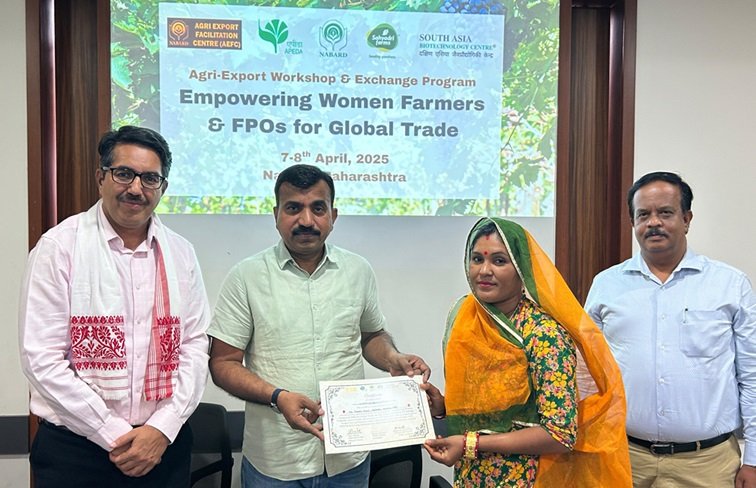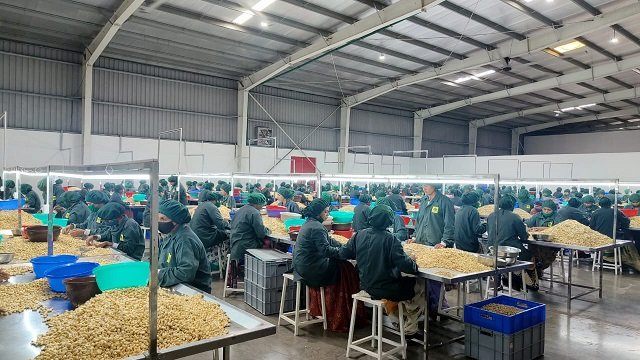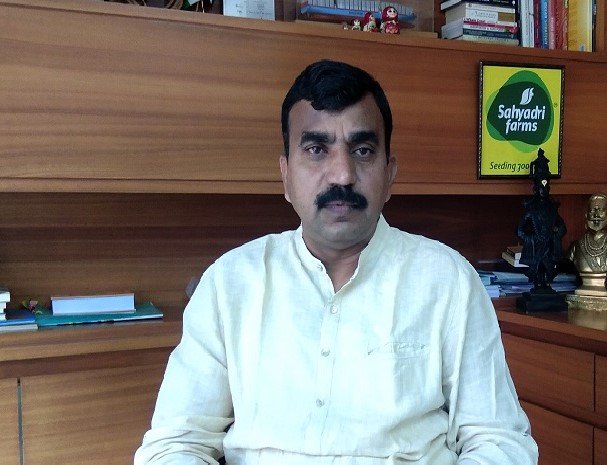Company records a remarkable 55 per cent growth in revenue from the previous year, with industry-leading EBITDA margins of 11.08 per cent.
Nashik based Sahyadri Farms, India’s largest fully integrated farmer-producer company, continues to make significant strides in transforming the horticulture sector and scaling its global presence. Despite global headwinds and challenges posed by geopolitical uncertainties, rising input costs, and climate change, Sahyadri Farms demonstrated robust growth during FY 2023-24. The company achieved a turnover of Rs 15,489 million, a remarkable 55 per cent increase from the previous year, with industry-leading EBITDA margins of 11.08 per cent. Leveraging its integrated value chain, Sahyadri Farms successfully procured and processed over 300,000 MT of crops from 26,000+ farmers, up by 25per cent. The company’s ongoing investment in R&D, operational efficiency, and sustainable practices ensured that it continued to navigate global challenges while contributing to India’s economic growth and food security.
Global Presence and Market Leadership
Sahyadri Farms has positioned itself as a leader in the global fresh produce market. With exports to over 40 countries, including major markets in Europe, the Middle East, and Southeast Asia, Sahyadri Farms holds a dominant position as India’s largest exporter of table grapes.
Beyond grapes, Sahyadri has expanded its portfolio to include bananas, pomegranates, and other fruits, which are now gaining a foothold in lucrative global markets.
The company’s focus on quality, traceability, and sustainability has been key to its success. Sahyadri Farms has invested heavily in research and development (R&D), trialling new fruit varieties that are more climate-resilient and easier to cultivate, ensuring higher yields and reduced costs for farmers. The company’s global reputation for excellence is built on its ability to provide premium-grade produce, meeting the strictest quality standards set by international buyers.
Robust Infrastructure for Growth
Sahyadri Farms operates state-of-the-art processing facilities across two campuses, with a combined land area of 170 acres in Nashik and Nanded. Together, these facilities have a processing capacity of 3,500 MT of horticultural produce daily, supported by cutting-edge packhouses, cold storage units, and value-added product lines. These facilities not only extend the shelf life of fresh produce but also ensure minimal post-harvest losses, creating a more sustainable and profitable system for farmers.
To further consolidate its leadership in the global market, Sahyadri Farms has developed multiple Strategic Business Units (SBUs) focused on fresh exports, processed products, and domestic supply chain management. Each SBU operates with a clear objective – whether it is increasing the export share, or ensuring that domestic consumers receive fresh, quality produce year-round. These SBUs are key to Sahyadri Farms’ strategy of delivering end-to-end solutions for both farmers and consumers.
Investments and Expansion Plans
In recent years, Sahyadri Farms has attracted significant investments from marquee global investors, positioning the company for accelerated growth and expansion. These investments have allowed Sahyadri Farms to upgrade its infrastructure, enhance its digital platforms, and strengthen its global distribution network. This infusion of capital is preparing the company for its next phase of growth, as it seeks to deepen its presence in existing markets and enter new international arenas.
Speaking at the Company’s Annual General Meeting, Vilas Shinde, Chairman and Managing Director of Sahyadri Farms, said, “For over a decade, we have focused on empowering farmers while creating sustainable value across the supply chain. As we continue to innovate, scale, and expand our reach into global markets, we remain committed to ensuring that our growth benefits not only our farmers but also consumers and the environment.”
By creating a strong farmer-owned brand, Sahyadri Farms is establishing itself as a trusted name in fresh and processed produce, known for quality, sustainability, and innovation. This brand, driven by the collective strength of thousands of farmers, is poised to become a household name not just in India, but globally.
Poised for Global Leadership
As Sahyadri Farms looks to the future, it is well-positioned to lead the global fresh produce industry. With its focus on innovation, sustainability, and farmer empowerment, the company is setting new benchmarks in the agrifood sector. By leveraging its extensive farmer network, state-of-the-art infrastructure, and strong brand, Sahyadri Farms is on a path to becoming a dominant force in international trade.
The company’s continued investment in R&D, digital transformation, and brand-building will further enable it to meet the rising global demand for safe, high-quality, and traceable produce. As Sahyadri Farms continues to expand its footprint globally, it remains committed to delivering value at every stage of the supply chain.
Commitment to Sustainability
Sustainability lies at the core of Sahyadri Farms’ operations. The company has implemented a range of eco-friendly initiatives, including solar energy generation, biogas production, and micro-algae-based water treatment systems.
In FY 2023-24 alone, Sahyadri Farms generated over 1,098 MWh of solar power and 374,200 kWh from biogas, reducing its carbon footprint significantly. These initiatives reflect Sahyadri Farm’s dedication to environmental stewardship, ensuring that its growth is aligned with long-term sustainability goals.
Additionally, Sahyadri Farms has embraced a circular economy approach by developing systems that repurpose agricultural by-products into high-value goods. Through its BioActives unit, Sahyadri Farms extracts valuable compounds from waste, such as seeds and peels, to create products for industries like cosmetics, nutraceuticals, and animal feed.
Company records a remarkable 55 per cent









